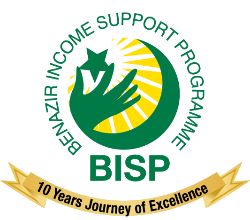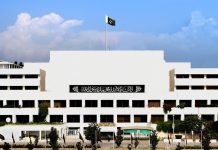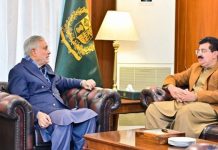By Ali Imran
ISLAMABAD: Chairperson Benazir Income Support Programme (BISP), Senator Rubina Khalid Friday said that BISP has set a target to create employment opportunities for the youth of the country by imparting them skill-based training.
“BISP would soon launch a new initiative “Benazir Hunarmand Programme” to impart skill-based training to the youth for their employability, enabling them to contribute positively to the country’s economy”, she said during a press conference, along with the senior officials.
Rubina Khalid said, “Pakistan is a country having major chunk of youth population which is directionless. This is the high time to focus on positively engaging their energies towards constructive purposes and create job opportunities for them”.
Under the Benazir Hunarmand Programme, women beneficiaries and their children will be given skill-based training to improve their economic conditions and create space for new participants in the program.
The chairperson said that BISP is an internationally acclaimed and largest poverty alleviation programme. “It is a matter of pride for us that international development organizations recognize the BISP as a model”, she added.
BISP’s National Socio-Economic Registry-based data aligns with international standards and the success of the program depends on this database.
The identification of deserving individuals through modern and scientific methods, the trust of international partners, and the transparency of third-party monitoring programs are evident to its credibility.
Considering BISP’s contributions towards provision of timely assistance to those affected during natural disasters, such as 2022 floods and COVID-19, the chairperson said, the other countries are inspired to implement similar social protection programs.
“This is a matter of pride for Pakistan that our institution serves as a beacon for many countries worldwide”, she said and added that a number of foreign delegations have been visiting BISP as a case study for research.
Rubina Khalid disclosed that the delegations from West African countries will visit Pakistan for an extensive briefing on social protection, particularly BISP from November 11.
She said these representatives will be given a detailed briefing on Pakistan’s social protection initiatives, specifically BISP and will be facilitating in visit to the regional BISP offices where they will meet with eligible women beneficiaries.
They will be briefed on the registration process for deserving families, visit the BISP One Window Center, and receive an overview of the payment system.
A roundtable conference will be held on November 14 with officials and stakeholders to develop a collaborative action plan, she said.
Recently, a 21-member delegation from Uganda visited BISP with the support of the World Bank and World Food Program and highly appreciated the program.
Dispelling the perception that BISP creates dependency, the Chairperson BISP said that BISP provides financial assistance to bridge the gap between the expenses and income of low-income households.
Briefing about the other initiatives of BISP, the chairperson conveyed that children from eligible families receive educational stipends based on 70 percent attendance under the Benazir Education Stipends. Around 9.7 million children are now enrolled in schools.
Through the Benazir Nashonuma program, Rubina Khalid said that financial assistance and nutritious food are provided to pregnant and breastfeeding mothers and their children. Approximately two million mothers and children benefit from the Benazir Nashonuma program.
She said that birth certificates are mandatory for children’s participation in the program, and the Sindh government has waived the birth registration fee in the province which is a good step.
The BISP has recently introduced a new banking model to distribute financial aid to eligible women in a transparent and dignified manner.
The BISP has been providing financial assistance of Rs. 10,500 per quarter to each family in a dignified manner to over 9.3 million eligible households which will be increased up to Rs. 13,500 from next year.
To address complaints from women about receiving insufficient funds during quarterly disbursements, Rubina Khalid said that BISP has introduced a new banking system on the special directives of the President and Prime Minister of Pakistan.
Previously, only two banks were responsible for distributing quarterly payments, however, now the country has been divided into 15 clusters, with six banks assigned to ensure transparency.
The chairperson highlighted that over 7,000 women have received training under BISP’s Digital and Financial Literacy Program.
She said that around 25 mobile registration vans are working in remote areas of Sindh and Balochistan to register needy individuals with BISP, with plans to increase this number.
Highlighting the steps to address complaints, Rubina Khalid said that BISP has launched a modern call center in collaboration with the National Telecommunication Corporation, aimed at providing authentic information and swift resolution of complaints for BISP beneficiaries and the general public.
For complaint registration or program-related information, the citizens can contact the call center at 0800-26477. BISP only sends messages from 8171 and citizens are advised to not trust any messages or calls from other numbers.





